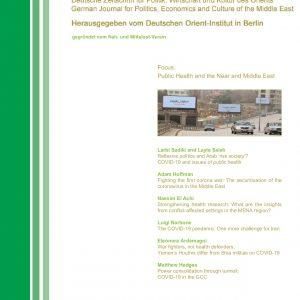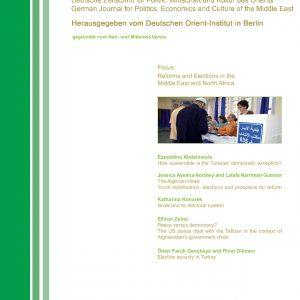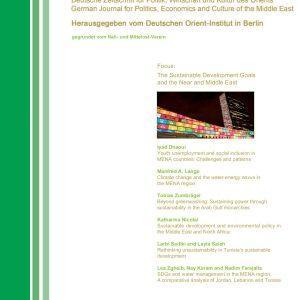Shop
Showing 225–240 of 350 resultsSorted by latest
-

Reflexive politics and Arab ‘risk society’? COVID-19 and issues of public health
7,90 €incl. VAT
Add to basket -

Orient III 2020
26,00 €incl. VAT
plus Shipping Costs
Select options This product has multiple variants. The options may be chosen on the product page -

Peace versus democracy? The US peace deal with the Taliban in the context of Afghanistan’s government crisis
7,90 €incl. VAT
Add to basket -

Election security in Turkey
7,90 €incl. VAT
Add to basket -

Israel and its electoral system
7,90 €incl. VAT
Add to basket -

The Algerian Hirak: youth mobilisation, elections and prospects for reform
7,90 €incl. VAT
Add to basket -

Orient II 2020
26,00 €incl. VAT
plus Shipping Costs
Select options This product has multiple variants. The options may be chosen on the product page -

How sustainable is the Tunisian democratic exception?
7,90 €incl. VAT
Add to basket -

Beyond greenwashing: Sustaining power through sustainability in the Arab Gulf monarchies
7,90 €incl. VAT
Add to basket -

Climate change and the water-energy nexus in the MENA region
7,90 €incl. VAT
Add to basket -

Youth unemployment and social inclusion in MENA countries: Challenges and patterns
7,90 €incl. VAT
Add to basket -

SDGs and water management in the MENA region: A comparative analysis of Jordan, Lebanon and Tunisia
7,90 €incl. VAT
Add to basket -

Rethinking unsustainability in Tunisia’s sustainable development
7,90 €incl. VAT
Add to basket -

Sustainable development and environmental policy in the Middle East and North Africa
7,90 €incl. VAT
Add to basket -

Orient I 2020
26,00 €incl. VAT
plus Shipping Costs
Select options This product has multiple variants. The options may be chosen on the product page -

Jordan: Stability and instability in the Hashemite Kingdom
7,90 €incl. VAT
Add to basket




